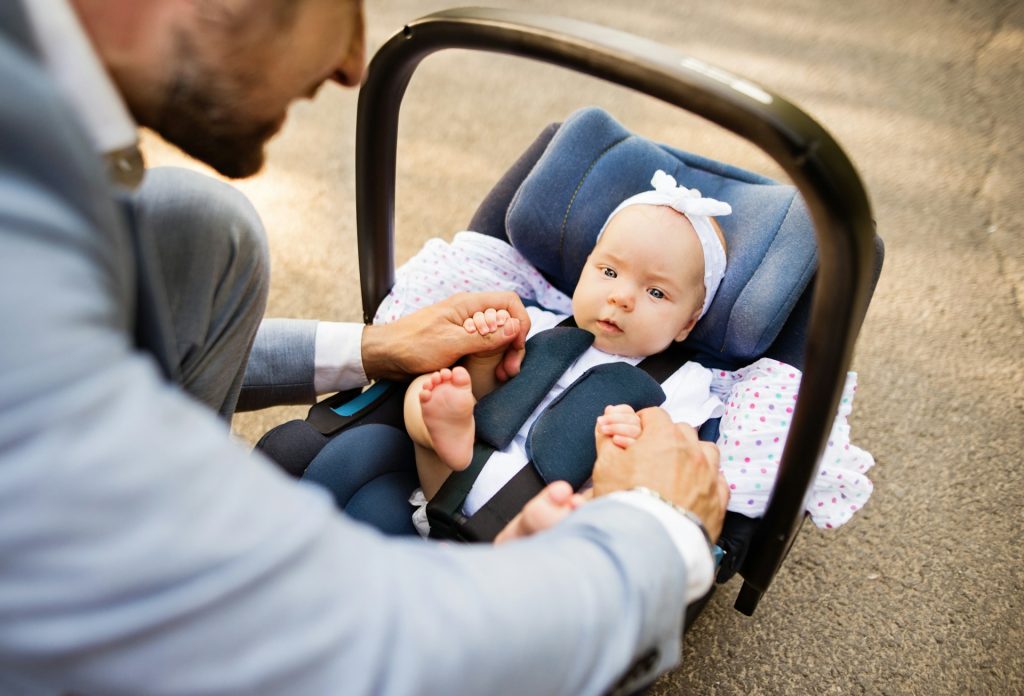Table of Contents
Parents flying domestically often wonder about their baby’s requirements. For most flights within the United States, infants and toddlers do not need a valid passport. However, airline policies can vary, so it’s best to check with your carrier ahead of time to confirm their identification requirements.
Despite not needing a valid passport on domestic routes, it’s crucial to stay prepared. Keeping your baby’s documentation updated and readily available can ensure a smoother travel experience, letting you focus on the trip and the memories you’ll create together.
Domestic Travel With Infants and Children
Air travel with infants and children on domestic flights is straightforward, with no need for a passport card. Understanding your airline’s policies beforehand can make your trip hassle-free and ensure everyone’s focus remains on the journey ahead.
Understanding ID Requirements for Domestic Flights
A government-issued photo ID is typically required for adult passengers on domestic flights but not for infants and toddlers, allowing families to travel without ID for the young ones.
Babies and Toddlers: ID Policies for Youngest Travelers
Traveling with babies and toddlers is easier because they don’t need a photo ID for domestic flights. Proof of age, such as a birth certificate, is usually enough during check-in or boarding. It’s wise to contact your airline ahead of time to confirm their ID policies for infants.
School-Aged Children: Parental Tips
Younger children don’t need ID for domestic flights, but school-aged kids might. Some airlines may ask for a birth certificate or school ID. For international trips, a valid passport and sometimes additional documentation, like parental consent if traveling with one parent, are necessary.
Traveling Alone as a Minor
Airlines offer unaccompanied minor services for kids aged 5 to 14 flying solo on domestic flights. Parents should familiarize themselves with these services and rules to prepare their children for a successful journey.
Domestic Solo Flight Policies for Ages 5 to 14
Minors aged 5 to 14 flying alone on domestic flights are usually enrolled in an airline’s unaccompanied minor program, which offers extra supervision and assistance. Airlines have specific rules and paperwork. Carrying identification can help verify the child’s age and identity if needed, although a photo ID is not commonly required for children in this age group.
Parents should review the guidelines and restrictions of the unaccompanied minor service with their children. Understanding the check-in process, layovers, and reception at the destination is key to ensuring their confidence and safety throughout the trip.
Guidelines for Unaccompanied Minors (Ages 15-17)
Unaccompanied minors aged 15 to 17 have more flexibility when traveling solo domestically. They may not need the unaccompanied minors service but should carry identification like a school ID, library card, or a driver’s license. A passport card is valid, but mainly for international travel.
International Considerations for Child Travelers

Traveling abroad with children requires an understanding of documentation requirements. Have all travel plans and documents ready in advance to ensure a smooth experience for both you and your child.
The Importance of Children’s Passports for International Travel
For international trips, every traveler, regardless of age, needs a valid passport. This includes infants and children. A child’s passport verifies their identity and citizenship, and they can’t board international flights without it.
The passport application process for children differs from that for adults. It needs both parents’ consent and the child’s presence. A baby needs a passport photo that meets specific requirements, which can be challenging to obtain.
Global Entry Benefits for Family Travel
Flying internationally with children can be easier with Global Entry, a program that expedites clearance for pre-approved travelers upon arrival in the United States. Enrolling your child requires a passport and a photo ID, and they must accompany you during the application process. The application fee is worth the time saved at security checkpoints, especially for multi-generational family trips.
Families benefit from Global Entry with reduced wait times and TSA PreCheck® access, streamlining the airport experience. If a child travels with member parents, they need their own Global Entry membership to use these benefits. The program is advantageous for international travel with young children.
Documentation for Single-Parent Travel With Children
When a child travels internationally with one parent, extra documentation might be needed. Countries may request parental consent from the non-traveling parent, confirming their approval of the child’s travel.
The consent needs to be notarized and may include travel details. It’s a precaution against child abduction and to ensure both parents know the plans.
Preparing for Your Child’s First Flight
Flying for the first time can be thrilling for a child. As a parent, you can make it enjoyable and stress-free by ensuring necessary preparations are in place. This includes knowing the required travel documents for your child and the airline’s policies for young travelers.
Domestic Travel Checklist With a Baby or Child
When preparing for domestic travel with a baby or child, a checklist can be invaluable. Ensure you have child travel consent forms if your child is flying with one parent or a guardian. Staying organized with a list will help you keep track of everything from diapers to boarding passes.
Essential Documents and Identification for Your Child
A passport isn’t needed for domestic travel, but you should carry identification for your child, such as a birth certificate or a Social Security card, along with health records, prescriptions, and a recent photo. The photo isn’t an official ID, but it can help airline personnel recognize your child.
Comfort Items and Necessities for In-Flight Ease
Ensuring your baby’s comfort during a flight is key. Pack a familiar blanket and favorite toys. Bring pre-measured formula or breastmilk in a cooler bag for feeding ease. Don’t forget the essentials: diapers, wipes, and a change of clothes for spills or accidents.
Cabin pressure can affect little ears. Have a pacifier or bottle ready for takeoff and landing to alleviate discomfort. Being prepared can turn a potentially stressful flight into a cozy experience for your baby, creating enjoyable travel memories for the family.
Common Concerns and Questions
Traveling with children raises questions about identification. Children do not need a passport for domestic flights, but it’s essential for international travel. Infants and toddlers can often fly as lap children without additional ID when traveling with an adult, but verify with your airline for specific ID requirements.
Identifying Suitable ID for Child Flyers
ID requirements for children can vary based on the journey. On domestic flights, a birth certificate is often sufficient. For passport applications, additional documents like a copy of the non-traveling parent’s consent or death certificate may be required.
Gather the necessary paperwork well in advance of your trip. Keeping a folder with essential documents can streamline the process for quick domestic trips or international travel with your little one.
Guidelines for Unaccompanied Minors
When a child travels without both parents, it’s crucial to have the correct documentation. For domestic travel within the U.S., children generally do not need the same travel documents as adults, but it’s wise to carry a notarized letter of consent from the absent parent(s).
For international travel, the requirements are stricter. Transportation security in many countries needs documented consent from both parents or legal guardians. This is particularly important in custody arrangements to avoid legal issues at border crossings.
Ensuring a Pleasant Family Travel Experience
When traveling domestically with children, having a game plan is essential. Prepare a packing list, check transportation security guidelines, and arrive at the airport early to avoid last-minute stress and ensure a relaxed boarding process.
Consider applying for your child’s passport during a domestic trip if you plan to travel internationally in the future. It’s a convenient way to be prepared for any travel opportunity without the pressure of an approaching international flight deadline.
Tips for Stress-Free Domestic Travel With Kids
For stress-free domestic travel with kids, familiarize yourself with ID requirements. Children under 18 usually don’t need an ID to fly domestically but bring a copy of their birth certificate. Check airline policies, as they can differ.
Board the plane with snacks and entertainment to keep children occupied. Start the passport process early for future international travel to avoid the rush and ensure your child has the necessary identification.
Navigating Airports and Flights With Young Children
Navigating airports and flights with young children can be daunting, but a few strategies can help. Engage your kids by explaining what to expect at the airport and during the flight. International airlines offer family services like priority boarding, also available with domestic carriers, so use them.
Keep your children’s favorite snacks and activities handy to distract them during long waits or flights. Remember, each child reacts differently to flying, so pack a variety of items to accommodate different needs. With thoughtful preparation, the airport experience can become a fun part of the adventure.
Protecting Your Child’s Journey

Ensuring your children’s safety and comfort during travel is the top priority. Whether it’s a quick weekend getaway or an extended family vacation, taking the right precautions matters.
Travel Consent Forms for Minors: When and How to Use Them
Travel consent forms are vital when your child is flying without you or with only one parent, especially for international travel. These forms affirm that children under 16 have permission to travel from the non-present parent or guardian. Always have this consent notarized to avoid issues during family travel.
A child’s travel consent within domestic borders provides peace of mind, serving as proof that all legal guardians agree on the trip. Keep a copy with you and leave one with a trusted family member at home to keep everyone informed about your child’s whereabouts.
Final Insights: Creating Memories on the Move
For parents and grandparents, traveling with little ones often marks the beginning of cherished family memories, whether flying domestically or internationally. Navigating airports becomes a learning adventure for kids, and they don’t usually need a passport. The youngest can suffice with a birth certificate or other original documents like a certificate of citizenship.
Securing a passport is essential for international travel with your child. This ID is necessary for exploring new cultures and landscapes. Some destinations may accept other forms of ID, such as a border crossing card, permanent resident card, driver’s license, or Native American tribal photo ID.




